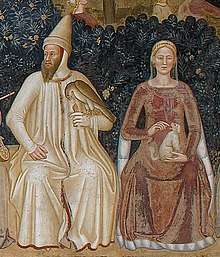Agnese Visconti
Agnese Visconti also known as Agnes (1363 in Milan – 1391 in Mantua) was a daughter of Bernabò Visconti and his wife Beatrice Regina della Scala. She was consort of Mantua by her marriage to Francesco I Gonzaga.

Family
Agnese was born in Milan, Italy and was the ninth of seventeen children.
Agnese's father, Bernabò, was a cruel and ruthless despot, and an implacable enemy of the Church. He seized the papal city of Bologna, rejected the Pope and his authority, confiscated ecclesiastical property, and forbade any of his subjects to have any dealings with the Curia. He was excommunicated as a heretic in 1363 by Pope Urban V, who preached crusade against him.[1] When Bernabò was in one of his frequent rages, only the children's mother, Beatrice Regina, was able to approach him.[2]
Agnese's maternal grandparents were Mastino II della Scala and his wife Taddea da Carrara. Her paternal grandparents were Stefano Visconti and his wife Valentina Doria.
Agnese's sister, Taddea Visconti, married Stephen III, Duke of Bavaria and was mother of Isabeau of Bavaria, wife of Charles VI of France. Agnese and the rest of her sisters secured politically advantageous marriages.

Marriage
Agnese's father led a policy of balance between the nearby powers of the Gonzaga family. Her father arranged for her to marry condottiero Francesco I Gonzaga, ruler of Mantua. He was the son of Ludovico I Gonzaga and Alda d'Este. Agnese brought a dowry of 50,000 gold scudi and the cities of Parma, Cremona, Brescia and Bergamo.
The couple had only one daughter:
- Alda Gonzaga (? -30 July 1405), who married in 1405 Francis II Novello da Carrara, Lord of Padua.
Agnese was later accused by her husband of having committed adultery with Antonio Scandiano. Agnese may not have been guilty, as her husband wanted to end his alliance with her father and wanted to form one instead with Gian Galeazzo Visconti. He could have just divorced Agnese, but to break off all relations with her father completely, it was necessary for Agnese to die. She was executed in Mantua 1391 along with her alleged lover.
References
- Barbara W. Tuchman, A Distant Mirror, p.263
- Tuchman, p.254